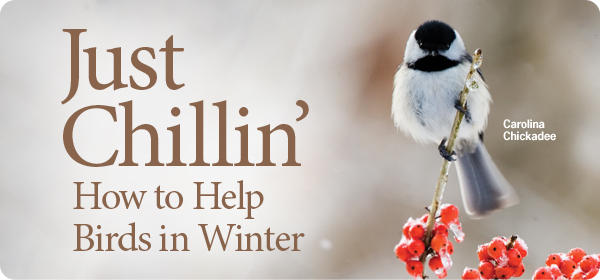Helping Birds Survive Winter Nights

Typically, your feeders serve as a supplemental source of food for birds in your yard. In contrast, during periods of cold and severe winter weather, your birds may switch to utilizing them as the critical source of food that enables them to survive from day to day.
Normally, birds that come to feeders obtain only about 20% of their daily calories from our feeders, with the rest being obtained naturally. However, the story changes dramatically during periods of cold temperatures. One study in Wisconsin showed that when the temperature drops below 10º F, chickadees without access to feeders had twice the mortality rate than their feeder-using counterparts.
Freezing temperatures are only one factor that birds must overcome in order to survive winter. Wind, storms and wet weather can also rob birds of their ability to stay warm, even at moderate temperatures.
The most often overlooked winter survival challenge for birds is having to endure the long period of darkness during a winter night. Depending on its location, a small songbird must sustain itself though 13- 15 hours of darkness by utilizing only its own fat reserves for fuel.
Songbirds may use up 75-80% of their fat reserves in one winter night. This is equivalent to 10% of their body weight being shed and replaced every day as they consume, store and utilize their body fat. This is comparable to a 200lb person losing and then gaining back 20lbs of fat every 24 hours!
Fat is the most concentrated energy source that a bird can consume and stored body fat is the primary energy supply that fuels a bird between meals and through these long winter nights Their daily challenge is to find enough food to not only make it through each day, but to also replace their fat reserves for the coming night -- all in the course of limited daylight hours.
High fat foods are a critical necessity that you can provide your birds to help them survive the long winter nights. And one of the best food to offer is WBU’s No Mess NM CD or No Mess LM which have been specifically formulated to provide birds’ with the much needed fat and energy they need to survive whatever winter throws at them

